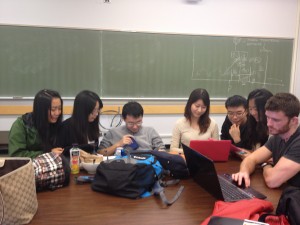This Thursday, our group met for the second time with our community partners from the Seeds program organizer, 2014 Summer Special Olympic organization representative, and UBC food services members to finalize our proposal. We are happy to announce that we have been approved by our community partners to focus our project direction to the nutritional component of food menu. We decided to separate the foods into nutritional and sustainable categories. The organizer expected us to separate the category into more specific groups. This way, they can use these categories as future reference to compare and add more food to the menu. This standardized table will also be a good educational component for athletes and coaches to read and learn during their dining at the games.
For the following week, we will email the UBC food services in order to meet with the dietitians and hopefully receive some food advices for our project. We will establish different criteria for food groups. Our goal for this will be to explain why these criterion are important to distinct different categories of food. After we have sorted food into different groups, we can finally define the term “sustainability” for this project; especially what sustainability means to our group
